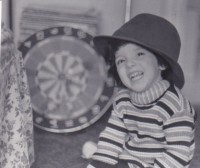When I look at the picture now, I can see it so clearly. I can see the braces. The braces were made of metal and leather and weighed more than I did. They were cumbersome and hideous and confined my movements almost as much as a straight jacket. My pigtails, new dress and big smile only magnified the orthopedic braces. And that was the point. I was not only crippled, but I was cute too, and that combination made for a perfect picture of pity. The image said, “Look at me. I can’t stand upright without braces and the aide of crutches. Isn’t that sad? Isn’t it tragic? I can’t run or play hide and go seek. My life is full of heartache and so much pain that you must want to look away. You want to create distance between you and I. That’s okay. It is only fate that made your kids strong and healthy. Does that make you feel guilty? I have an easy fix. You can donate money to United Cerebral Palsy so there won’t be as many kids like me. That way you have done your part and you can sleep peacefully tonight.” Donation cans were all over town, with that picture plastered on the front. People could throw in their spare change and not have to think about me anymore.
It was all lost on me at the time. As a six-year-old kid, when I was chosen to be poster child for United Cerebral Palsy in Bergen County New Jersey, I was excited. I thought it was cool. I thought it was important. I thought it was an honor.
My parents have told me a story repeatedly about the year I was poster child. Halfway through the year, my orthopedist told them I didn’t need my long leg braces anymore. They had served their purpose and were no longer necessary. Back in 1974, the powers that be at United Cerebral Palsy told my parents that I could not be photographed as poster child unless I was wearing the braces. They didn’t think I looked pitiful enough without them.
In the forty plus years since then I have thought often about their motivation. On the surface I can sort of see that at the time the idea was to raise as much money as possible, and back then the most effective way to accomplish that was to pull hard on the community’s heart strings.
What I don’t understand is why nobody at UCP considered the potential damage of what they were doing on me. Didn’t anybody realize how demeaning it is to be the object of somebody’s pity? Didn’t they know that by trying to make people feel sorry for me they were making sure the playing field was never going to be equal? They were making a division between the “us’s” and the “them’s” of society. It has taken me a while to erase that line. Some people will never let me do it completely.
The other thing I believe happened in the year when I was poster child was that I began to internalize that message. I began to see my physical weakness as a deficit that was going to limit what I was capable of in life. That was the goal of the picture. The sad part is, in the process, it rubbed off on me.
Do I think that being poster child has really stopped me from doing what I want to do? No. But I will admit I have struggled with confidence and having a positive self-perception. There have been many times when that struggle has gotten in my way. Honestly, I don’t  know how much of that comes from the fact that I was poster child forty years ago. There are times even now when I go to a restaurant with friends or out to the grocery store and people look at me with pity. Some still avoid eye contact or watch me struggle and want to look away.
know how much of that comes from the fact that I was poster child forty years ago. There are times even now when I go to a restaurant with friends or out to the grocery store and people look at me with pity. Some still avoid eye contact or watch me struggle and want to look away.
Ironically, these days I have a career as a writer and public speaker. The main topic I explore is disability awareness and empowerment. I figure if I can tell a group of people something they didn’t know about disability or maybe challenge some negative perceptions a bit, then there is potential for some kids with disabilities not to experience some of the things that I did. If that is the outcome, then I can live with all I went through.
When I look at the UCP website today, I am convinced that the organization and I have the same goals. We want people with disabilities to be seen in a context of power not pity, and we want the community to view those with disabilities with a “one of us” attitude.
When I get ready to speak, I feel this odd mixture of nerves and excitement, and get so worked up that sometimes I think I am going to be sick. But at that point, I take a deep breath, exhale slowly and examine the crowd. I make a point to make eye contact with as many people as possible.
My message is simple. “Look at me, I am just like you.”
This post can also be found on Voices of UCP.
